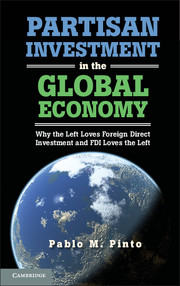 Partisan Investment in the Global Economy
Partisan Investment in the Global Economy Book contents
- Frontmatter
- Contents
- List of Figures
- List of Tables
- Acknowledgments
- 1 Domestic Coalitions and the Political Economy of Foreign Direct Investment
- 2 A Political Economy Model of Foreign Direct Investment
- 3 Tying Hands or Exchanging Hostages: Partisan Governments, Commitment, and FDI Performance
- 4 Partisan Governments and Foreign Direct Investment: Results from Cross-Country Statistical Analyses
- 5 Labor and Business Influence, Investment Regimes, and Foreign Investment in Argentina
- 6 Business Influence, Politics, and Foreign Direct Investment in South Korea
- 7 Conclusion
- Bibliography
- Index
4 - Partisan Governments and Foreign Direct Investment: Results from Cross-Country Statistical Analyses
Published online by Cambridge University Press: 05 March 2013
- Frontmatter
- Contents
- List of Figures
- List of Tables
- Acknowledgments
- 1 Domestic Coalitions and the Political Economy of Foreign Direct Investment
- 2 A Political Economy Model of Foreign Direct Investment
- 3 Tying Hands or Exchanging Hostages: Partisan Governments, Commitment, and FDI Performance
- 4 Partisan Governments and Foreign Direct Investment: Results from Cross-Country Statistical Analyses
- 5 Labor and Business Influence, Investment Regimes, and Foreign Investment in Argentina
- 6 Business Influence, Politics, and Foreign Direct Investment in South Korea
- 7 Conclusion
- Bibliography
- Index
Summary
Introduction
In this chapter, I aim to assess the effect of the partisan alignments of the chief executive in the host country on the levels of inbound foreign direct investment (FDI) flows. I present the results from statistical analyses of the main hypotheses derived in Chapters 2 and 3. The statistical models build on a vast body of empirical literature in economics on the determinants of capital flows. The analysis establishes that when the conditions for investment are present, politics can have a sizable impact on investment flows. The driving political force in the host country reflects the expected distributive consequences of investment inflows. As I argue in Chapters 2 and 3, governments are likely to adopt investment regimes that benefit their core constituents and to abide by these policies over time. Pro-labor governments promote the well-being of workers and pro-business governments promote policies that benefit domestic capital owners. In the first stage of the analysis, I assess the external validity of one of the implications of this partisan hypothesis, namely the effect of partisanship on investment policy.
For this purpose, I develop a measure of investment policy orientation using data from OECD countries. There are numerous policy instruments, or political outcomes, that affect either the returns to capital or its form of entry, which is ultimately what FDI regimes target. Host governments may, among other initiatives, grant tax breaks and subsidies, regulate market structure, adjust trade policy, protect property rights, establish nationality and/or performance requirements, or create differential exchange rates in order to attract or deter the inflow of capital.
- Type
- Chapter
- Information
- Partisan Investment in the Global EconomyWhy the Left Loves Foreign Direct Investment and FDI Loves the Left, pp. 97 - 141Publisher: Cambridge University PressPrint publication year: 2013
- 1
- Cited by


